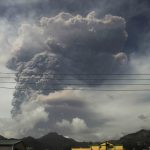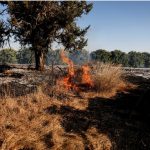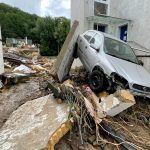Pepinster in Belgium is a village upended – built at the confluence of two rivers, and completely vulnerable when the rivers became torrents.
We spent hours trying to access it via flooded and cut-off roads.
When we finally reached the area, the destruction was hard to fathom.
Cars had been tossed aside, train tracks destroyed, water was still raging through factories and along high streets.
Helicopters buzzed overhead, watching for buildings collapsing and people still in need of rescuing.
Miriam Darraji and her family were wandering around the wreckage of their home and property.
They used to love living so close to the water, but now everything is ruined, and they are scared about what happens next.
“I think this has to be a consequence of climate change, it’s just inexplicable,” she said.
“We’ve experienced heavy rains before but never this.
“We want to move, we want to leave, we don’t want to stay here.
“We lost our land down the river… it’s a catastrophe.”
Further down the village, Bernadette Henom was trying to push filthy mud out of her house in bare feet. She thought it was better than getting another pair of shoes soaked.
I asked her if she thought climate change made the devastation worse.
She said: “I think so – nature is showing her anger right now, nature is angry”
Scientists have said that, although it is hard to directly and definitively link single events to climate change, it does make extreme weather more frequent and more severe.
Increasingly, they say, the fingerprints of climate change can be found on catastrophic flooding, heatwaves and drought.
The Intergovernmental Panel on Climate Change’s lead author and Liege resident Professor Francoise Gemenne told Sky News: “These floods remind us that impacts of climate change will also materialise in western countries.
“We need to understand that we have induced a change in the climate that is irreversible.
“What we used to consider the exception has become the normality.
“There will be no return to the climate we used to know, there will be no vaccine against climate change.”
It leaves villages like Pepinster to wonder about the future.
If Western Europe is going to start to see more of this, adaption will become increasingly important, forcing communities to rethink how and where they build, and how they protect business and infrastructure for when it happens, next time.






















